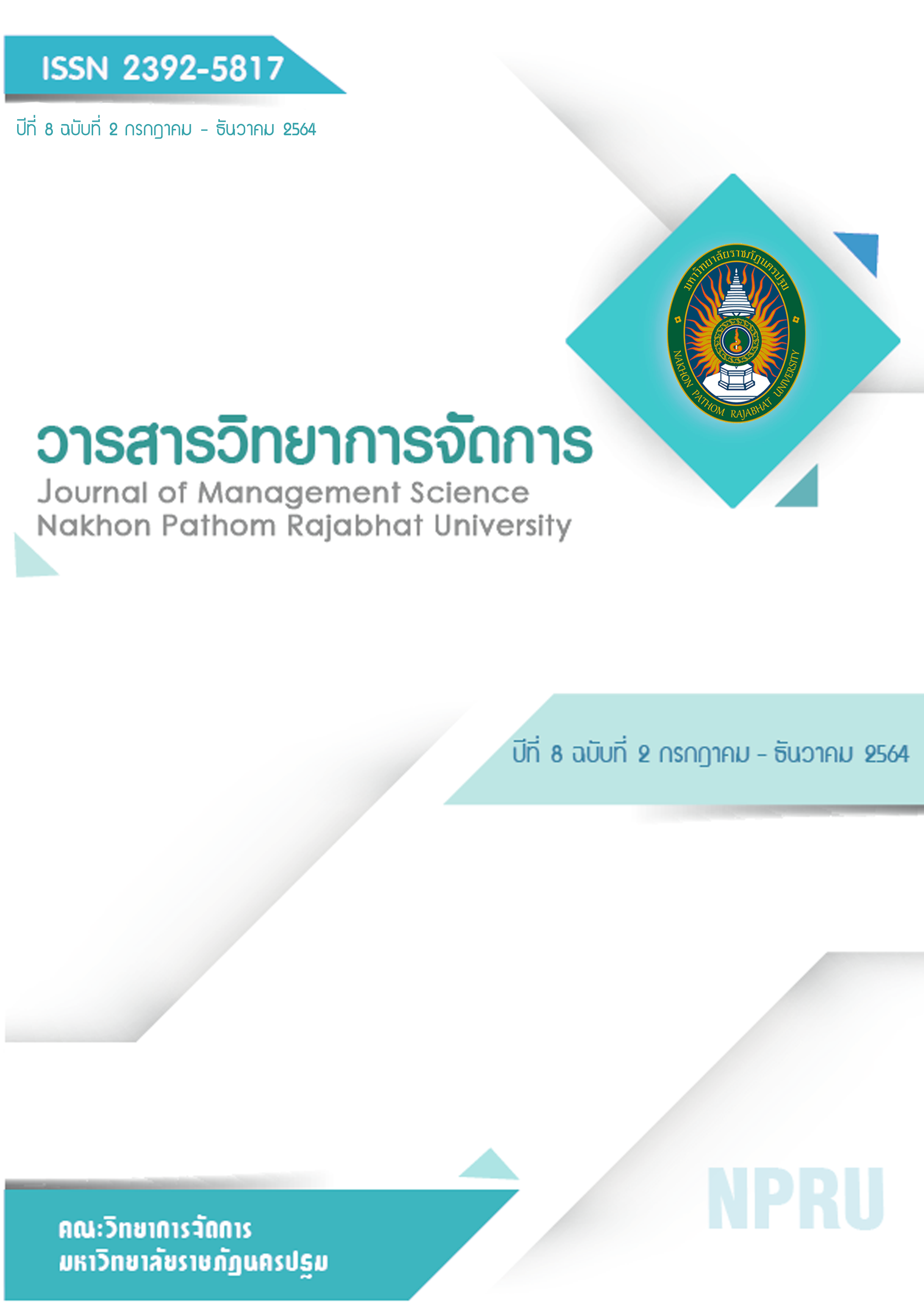The Influence of Engagement Affecting Organizational Citizenship Behavior of Generation Y Employees in Bangkok and its Vicinity
Main Article Content
Abstract
The objectives of this research were to study (1) organizational citizenship behavior of Generation Y employees in Bangkok and its vicinity when classified by personal factors and (2) the influence of engagement affecting organizational citizenship behavior of Generation Y employees in Bangkok and its vicinity. The researcher used convenience selection, by collecting online questionnaires from employees of private companies in Bangkok and its vicinity. Data were treated and analyzed by using descriptive and Inferential Statistics methods, which were percentage, mean, standard deviation, independent t-test, One Way ANOVA and Multiple Regression Analysis.
Findings:
1. A good member of the organization of Generation Y employees in Bangkok and its vicinity There is a difference according to the status and the income was statistically significant at the 0.05 level
2. Influences of engagement affecting organizational membership of Generation Y employees in Bangkok and and its Vicinity consisted of compliance (b=0.22), organizational identification (b=0.27), and organizational internalization (b=0.36) The equation has 44% predictive power. The forecast equation can be written as follows.
Y ̂= 0.18+ 0.22 x1 ** + 0.27 X2 **+ 0.36 X3**
Article history : Received 8 January 2021
Revised 15 February 2021
Accepted 28 February 2021
SIMILARITY INDEX = 1.45 %
Article Details
The views and opinions of the article appearing in this journal are those of the author. It is not considered a view and responsibility of the editorial staff.
References
พฤติกรรมการเป็นสมาชิกที่ดีขององค์การของบุคลากรในมหาวิทยาลัย ปัจจัยส่วนบุคคลประเภท
บุคลากร รายได้เฉลี่ยต่อเดือน และวุฒิการศึกษา มีผลต่อพฤติกรรมการเป็นสมาชิกที่ดีขององค์การ.
วารสารบัณฑิตศึกษา มหาวิทยาลัยราชภัฎวไลยอลงกรณ์ ในพระบรมราชูปถัมภ์. 13 (1).37-50.
ธนัชพร เลขวัต และรัชนีวรรณ วนิชย์ถนอม. (2560).ความสัมพันธ์ระหว่างบุคลิกภาพห้าองค์ประกอบ การรับรู้
บรรยากาศองค์การและพฤติกรรมการเป็นสมาชิกที่ดีขององค์การ โดยมีความสุขในการทำงานเป็นตัว
แปรสื่อของข้าราชการในหน่วยงานราชการแห่งหนึ่ง.วารสารสังคม และมนุษยศาสตร์ มหาวิทยาลัย
เกษตรศาสตร์ .43 (1).99-118.
ประไพศรี ธรรมวิริยะวงศ์. (2562).แนวทางการพัฒนาความผูกพันของพนักงานในองค์กร. วารสารวิทยาลัย
ดุสิตธานี .13 (2).493-504
วิภาพร สิงห์บุตร.(2562).ปัจจัยสภาพแวดล้อมในการทำงาน และความผูกพันต่อองค์การที่มีอิทธิพลต่อ
พฤติกรรมการเป็นสมาชิกที่ดีของบุคลากรส่วนกลาง กรมศุลกากร.วารสารบริหารธุรกิจและ
สังคมศาสตร์ มหาวิทยาลัยรามคำแหง. 1 (2). 110-12.
Bateman, T. S., & Organ, D. W. (1983). Job Satisfaction and the Good Soldier: The
Relationship between Affect and Employee “citizenship”. Academy of Management
Journal, 26(4), 587-595
Byrne, Z. S. (2014). Understanding employee engagement: Theory, research, and practice.
NY: Routledge.
Chester, B. I. (1938). The Functions of the Executive. Cambridge, MA: Harvard
University Press.
Cochran, W. G. (1953). Sampling techniques. NY: John Wiley
Farh, J. L., Zhong, C. B., & Organ, D. W. (2004). Organizational citizenship behavior in the
People's Republic of China. Organization Science, 15 (2), 241-253.
Organ, D. W. (1988). Organizational Citizenship Behavior: The Good Soldier Syndrome.
Lexington, MA: Lexington Books.
Organ, D. W. (1990). The motivational basis of organizational citizenship behavior. In
B. M. Staw & L. L. Cummings (Eds.), Research in organizational behavior. (pp. 43–72). (12th ed.) Greenwich, CT: JAI
Organ, D. W., Podsakoff, P. M., & MacKenzie, S. B. (2006). Organizational Citizenship
Behavior: Its Nature, Antecedents and Consequences. Thousand Oaks: Sage.
Riggio, R. E. (2002). Introduction to Industrial / Organizational Psychology. (4th ed.) NJ:Prentice-Hall.
Smith, C. A., Organ, D. W., & Near, J. P. (1983). Organizational Citizenship Behavior:
Its Nature and Antecedents. Journal of Applied Psychology, 68(4), 653-663.
Spitzmuller, M., Van Dyne, L., & Ilies, R. (2008). Organizational citizenship behavior: A review
and extension of its nomological network. The SAGE handbook of organizational behavior, 1, 106-123.

